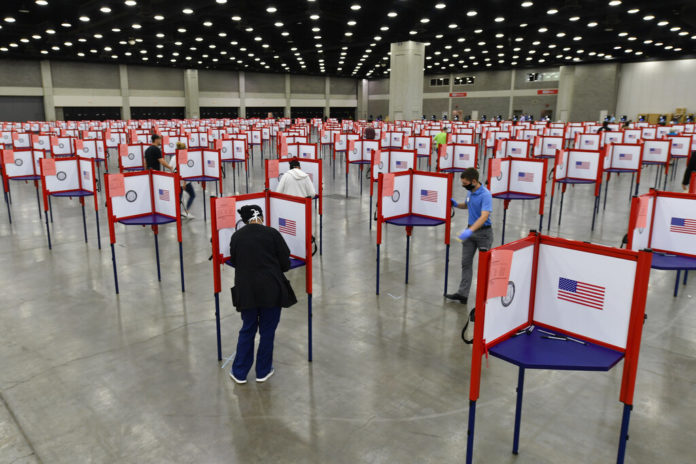
Arizona voters are likely to see four voter initiatives on their November ballot, although all four must first survive a review of qualifying signatures turned into the Secretary of State’s office this week and legal challenges that routinely are made.
The four that turned in their qualifying signatures by Thursday’s deadline include measures that would raise taxes on high-earners to boost school funding, legalize recreational marijuana, implement sentencing reform and impose a slew of new rules on hospitals and insurers.
All four campaigns turned in well over the required 237,645 signatures, improving their chances of making it through the coming signature reviews as well as surviving legal challenges.
Many initiatives were sidelined when the coronavirus pandemic first hit the state in March. The shutdowns that followed ended most in-person signature gathering at the start of the most productive months for petitions. Those that dropped out included a measure backed by many educators limiting school vouchers and another that would ban most use of anonymous campaign cash.
The four that continued collecting signatures ended up with at least 160,000 more than they need to get on the ballot, well above the normal cushion backers aim to collect. They are:
— Invest in Education Act
The proposed initiative backed by many educators and the state teachers union would impose a 3.5% tax surcharge on income above $250,000 for an individual or above $500,000 for couples and aims to raise about $940 million a year for schools. It is the latest outgrowth from a teacher strike two years ago that highlighted low wages for educators and a slow rebound from budget cuts enacted during the Great Recession. The walkout secured higher wages for teachers, but many education interest groups said it fell short. Half of the new tax would be devoted to raises for credentialed teachers, 25% to boost wages for cafeteria workers, bus drivers and other support staff, and the rest for teacher training, vocational education and other initiatives.
— Smart and Safe Arizona Act
The measure would legalize recreational marijuana use in Arizona for people ages 21 and over. Purchases would be charged the regular sales tax plus a 16%, which would fund the government’s cost of administering the program. Any money left over will go to community colleges, infrastructure, roads and highways, public safety and public health. The measure also allows people who have been arrested or convicted of some marijuana offenses, such as possessing, consuming or transporting 2.5 ounces or less, to petition to have their records expunged. And it clarifies that people can be charged with driving while impaired by marijuana.
ADVERTISEMENT
— Second Chances, Rehabilitation, and Public Safety Act
This initiative backed by a Quaker religious group will cut sentences for people convicted of non-dangerous offenses by 15% to 50% by allowing inmates to earn release credits. It also removes mandatory sentencing for non-dangerous criminals, allowing judges to use their discretion. The measure bars people from being sentenced as repeat offenders if they commit multiple crimes in one series, and it allows some people currently incarcerated to apply for re-sentencing. The Legislature has rejected many of the proposals in recent years.
— Stop Surprise Billing and Protect Patients Act
The proposal backed by labor unions would bar insurers from charging people more if they have a pre-existing condition, and ban higher charges if a patient uses an out-of-network provider. It requires insurers to reimburse providers at specific ranges. And it sets a new minimum wage for providers at private hospitals by requiring 5% raises per year for four years. It also sets hospital safety standards for infection control overseen by state regulators.
All but the sentencing reform measure are opposed by the Arizona Chamber of Commerce and Industry, which in recent years has sued to keep initiatives it opposes off the ballot or spent large amounts to defeat them.
“If these initiatives pass, they could change the entire fabric and future of the state,” Chamber CEO Glenn Hamer said in a statement. “Between now and Election Day we look forward to discussing with voters why rejecting each one of these initiatives is the wise decision.”
Republished with the permission of the Associated Press.












